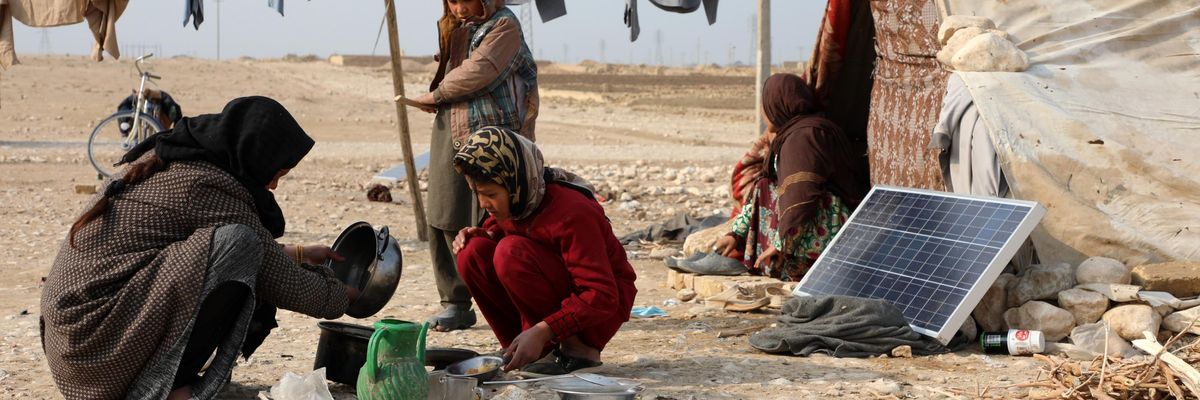Rights organizations on Thursday responded to a new Biden administration plan to use $3.5 billion in U.S.-held Afghan funds to "help mitigate the economic challenges" facing the people of Afghanistan by saying the proposal was "better than keeping that money locked away in a U.S. vault" but must only be the first step in returning $7 billion in stolen money to Afghanistan.
"We urge the U.S. government, the Afghan Fund, and DAB to work closely together to ensure that the money from the Afghan Fund is channeled to the Afghan Central Bank as soon as possible."
Following months of outcry from economists, peace groups, and Afghan rights campaigners, the U.S. Treasury Department said Wednesday that it is coordinating with international partners, including the Swiss government, to establish what it called the "Afghan Fund."
The fund will include "$3.5 billion of Afghan central bank reserves to be used for the benefit of the people of Afghanistan while keeping them out of the hands of the Taliban and other malign actors," the Treasury Department said, and will make "targeted disbursements of that $3.5 billion to help provide greater stability to the Afghan economy."
The Afghan economic justice group Unfreeze Afghanistan said that "the freezing of this money has devastated Afghanistan's economy and contributed to one of the worst humanitarian crises in the world,"
"Over the past year, the banks have been so starved for cash that Afghans have been unable to withdraw their own money for paying basic household expenses or running their businesses," said the group. "We believe the Afghan people would ultimately be best assisted if these funds are quickly made available for Central Bank functions."
The money being placed in the Afghan Fund represents half of the Da Afghanistan Bank (DAB) reserves, stored in the Federal Reserve Bank of New York, which were seized by the U.S. earlier this year even as Afghanistan faced a worsening hunger crisis.
The Biden administration said earlier this year that the other $3.5 billion would be retained to potentially be claimed by the families of victims of the September 11, 2001 attacks to settle legal judgments against the Taliban--a proposal that several families objected to, saying the money belonged to the people of Afghanistan.
Last month, a U.S. federal judge concluded that the families should not be permitted to claim the funds.
On Wednesday, U.S. Deputy Secretary of State Wendy Sherman said the U.S. is taking an "important, concrete step forward in ensuring that additional resources can be brought to bear to reduce suffering and improve economic stability for the people of Afghanistan while continuing to hold the Taliban accountable."
The Center for Economic and Policy Research (CEPR) denounced the Biden administration's statement as "pure spin," noting that the $3.5 billion in Afghan funds is not the United States' money to disburse.
"The Afghan Fund is funded by Afghanistan, and the U.S. is only delivering unprecedented suffering," said the CEPR.
Since the U.S. has withheld the $7 billion from the DAB, Afghanistan's humanitarian crisis has steadily grown more dire, with six million people facing famine and an estimated three million children suffering from acute malnourishment.
September 11th Families for Peaceful Tomorrows expressed gratitude that the Afghan economy will receive a boost through the Afghan Fund, and called on the Biden administration to return the full $7 billion it confiscated.
Unfreeze Afghanistan said that now that the U.S. has committed to place $3.5 billion in the fund, the reserves must be sent to the DAB as quickly as possible to benefit the Afghan people.
The DAB has already agreed to independent monitoring of its funds, said Unfreeze Afghanistan, adding that the international community must now "assist DAB in getting the technical capacity needed to implement" anti-money laundering and anti-terrorism funding controls.
"We urge the U.S. government, the Afghan Fund, and DAB to work closely together to ensure that the money from the Afghan Fund is channeled to the Afghan central bank as soon as possible," said the group, "with the goal of shoring up the nation's economy and alleviating the suffering of the Afghan people."
U.S. Rep. Pramila Jayapal (D-Wash.), chair of the Congressional Progressive Caucus, added the U.S. must "follow this action by reassuring banks and governments worldwide that engage with Afghanistan's central bank to provide liquidity will not face sanctions."
Afghanistan's current crisis "has been intensified by the Western freeze of Afghanistan's reserve assets held abroad--a policy that has contributed to an economic depression, mass hunger, and displacement," said Jayapal. "While this fund has the potential to unlock $3.5 billion of the $7 billion in U.S. possession--which should be pursued swiftly--we believe the full $7 billion that rightfully belongs to the Afghan people should be restored to the Central Bank."

